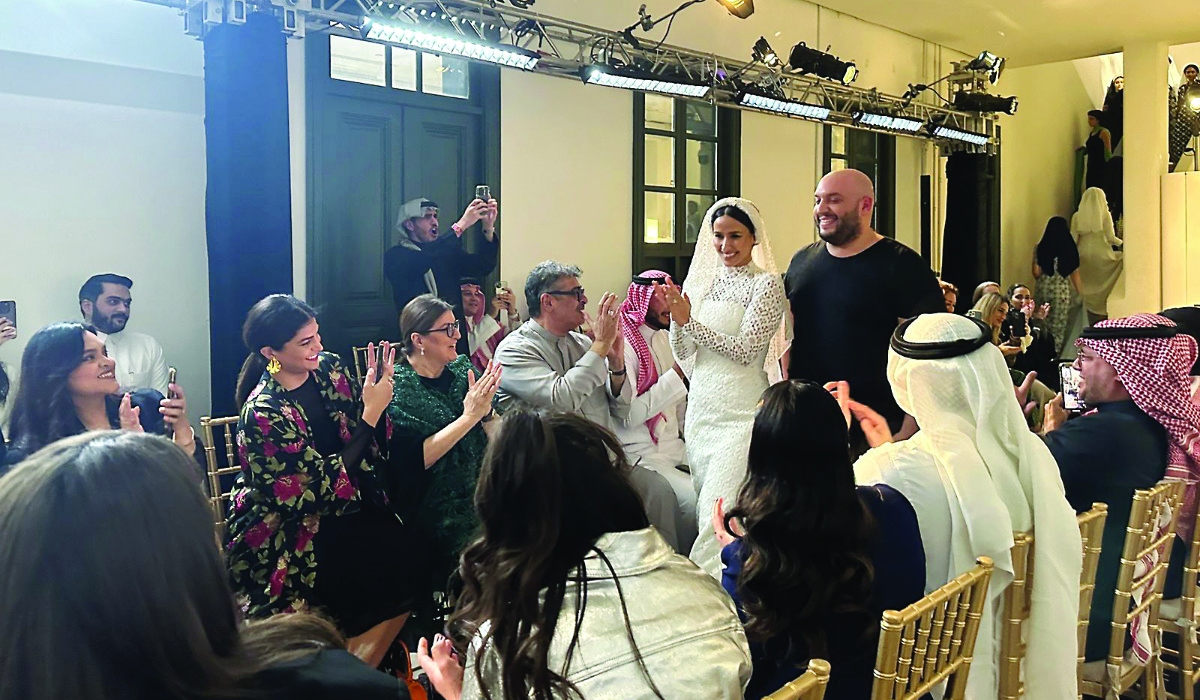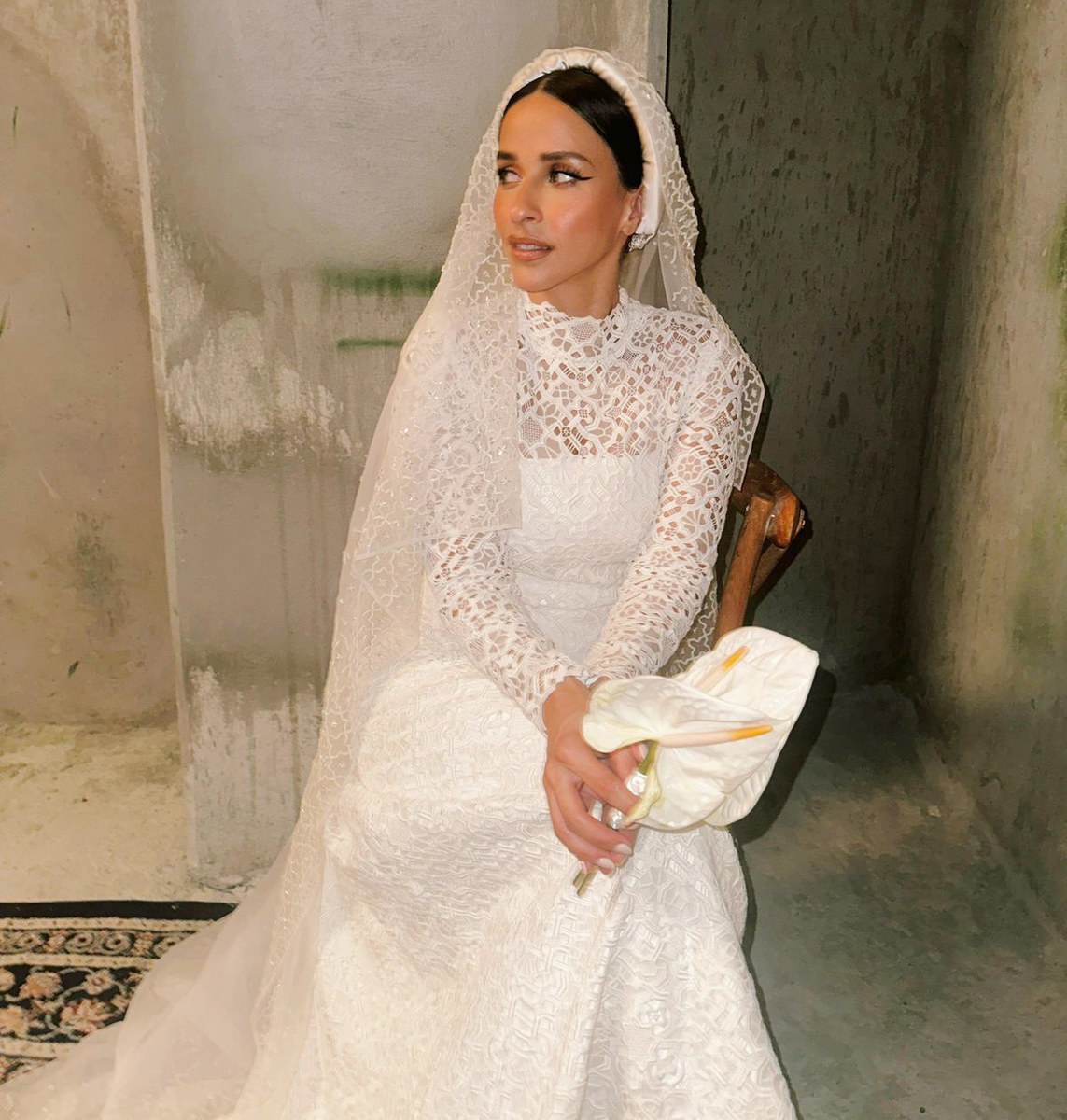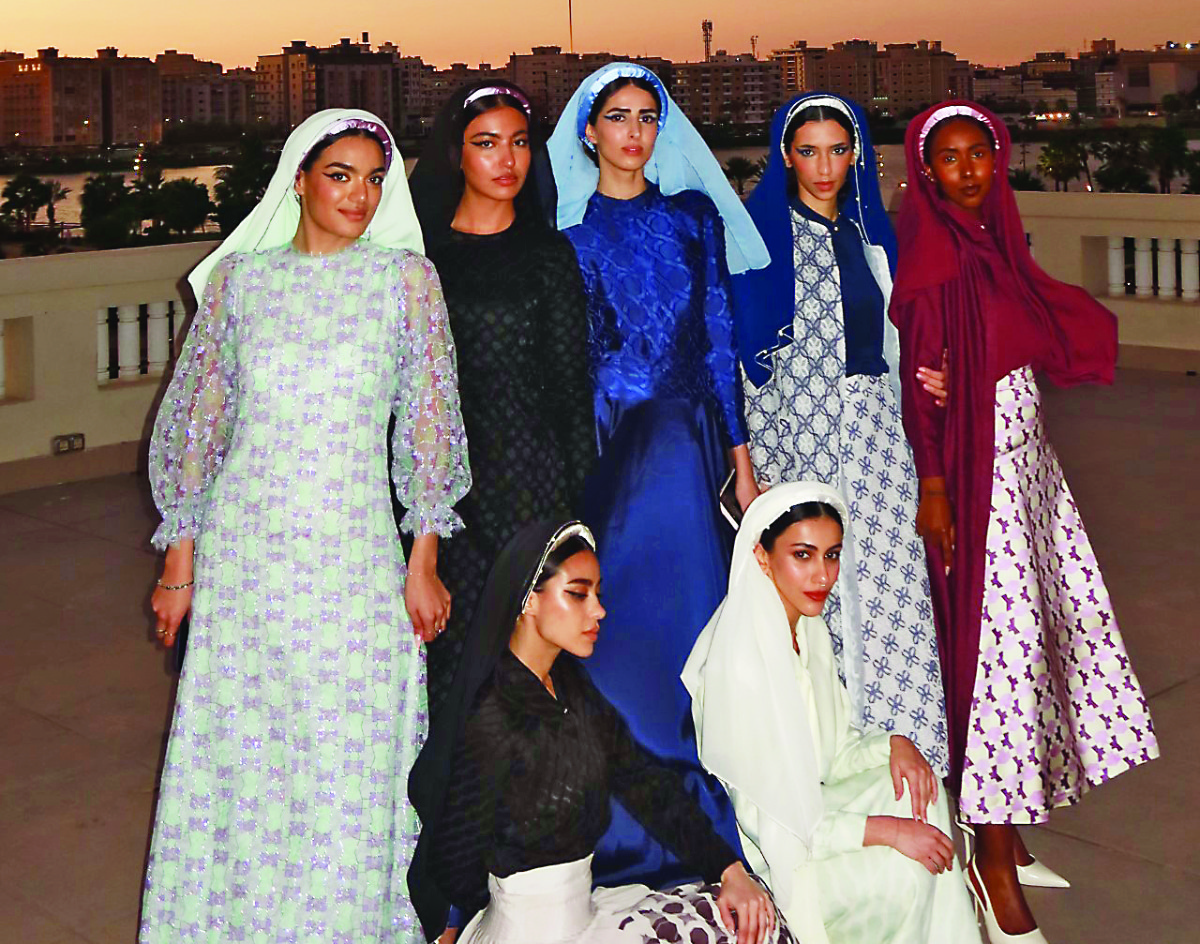JEDDAH: In a remarkable fusion of tradition and modernity, Banat Al-Balad, a fashion collection by Saudi designer Makram Marzuki showcased at Zainal House in Jeddah’s historic district Al-Balad on Saturday, pays homage to the rich cultural heritage of Jeddah.
Marzuki, originating from Jeddah, selected his hometown as the muse for this unique collection, aiming to encapsulate the essence of Al-Balad’s stone facades and decorative rawashin.
The collection, rooted in the intricate beauty of Hijazi architecture, draws inspiration from the ornate rawashin and mangour window screen patterns that have long been a distinctive feature of the region’s buildings.

The Banat Al-Balad bridal look features a roshan pattern inspired by the one in Beit Nassif. (Photos by Jaleel Felemban/ AN photo)
Rawashin are an architectural feature prominent in Hijazi architecture, particularly in the historic areas of Jeddah and Makkah in Saudi Arabia. The term roshan refers to elaborately carved wooden window frames or latticework screens that are an integral part of traditional houses in the Hijaz region. These ornate wooden screens serve several practical and aesthetic purposes. The mangour patterns are the primary inspiration adorning each piece of textile in the collection.
The collection features 23 dresses worn by Saudi models from all 13 regions of the Kingdom, highlighting the diversity of Saudi beauty.
HIGHLIGHTS
• Banat Al-Balad draws inspiration from the ornate rawashin and mangour window screen patterns that have long been a distinctive feature of the region’s buildings.
• Recent Royal Institute of Traditional Arts graduate Samaher Bashamakh reinterpreted the traditional wooden patterns for textile.
Each piece in the Banat Al-Balad collection is a testament to the rich cultural tapestry of the Kingdom, brought to life through the collaborative efforts of artist Ahmed Angawi and recent Royal Institute of Traditional Arts graduate Samaher Bashamakh, who reinterpreted the traditional wooden patterns for textile. Traditional and innovative weaving techniques from some of the world’s most renowned mills helped bring it all together.
Marzuki told Arab News in an exclusive interview before the show: “We really tried to do a visual identity that is Saudi. So, when we thought about it, what is Saudi really rich in visually? It is geometry.”
Speaking about the significance of Zainal House to the collection, he said: “This is a really important house. It’s the first one to be built on brick. It’s a UNESCO heritage site. And we just thought of the grandeur of the double staircase … We thought about a new real entrance and the drama and what it could do.”

Rae Joseph, Creative Consultant. (Photo/Supplied)
Each of the models was crowned with a head scarf known in Hijazi tradition as “mihrama mudawara.”
Marzuki said: “I remember my great-grandmother wearing this. So, we tried to get it to match each look.”
The collection features several standout looks that demand attention. The velvet pieces are the result of intricate jacquard weaving, produced in one of the last remaining velvet mills.

Showcased at Zainal House in Jeddah’s historic district Al-Balad on Saturday, Banat Al-Balad by Saudi designer Makram Marzuki pays homage to the rich cultural heritage of Jeddah. (Supplied)
Evening attire sparkles with hand-painted glitter film and velvet insertions on a lever lace base, showcasing the meticulous craftsmanship involved.
A highlight of the collection is the bridal look, created with guipure mangour lace by a Swiss mill and complemented by a silk organza veil crafted with French embroidery, requiring around 400 hours of work. Each look is crowned with a mihrama mudawara, made from cotton voile and satin duchesse, honoring the traditional attire of the region.
Marzuki explained that the day looks focus on practical, wearable clothing suitable for the workplace — business casual and smart casual attire that is both stylish and comfortable.
Emphasizing modesty, the collection includes shirts, coats, skirts, and day dresses, addressing the need for a refreshed work wardrobe for women. The aim is to provide options beyond traditional abayas, offering a Saudi touch to smart casual wear for the global audience.
Regarding garment choices, the designer highlights the consideration of comfort in warm climates, incorporating lace and even bamboo fabric for heat-friendly options.
The collection explores negative and positive space with perforated designs showcasing roshan-like patterns. Additionally, some dresses feature the patterns translated into velvet, while custom-made shoes, crafted in collaboration with ZYNE, also integrate the unique elements of the roshan.
The patterns in the collection are inspired by different houses, including Matbouli, Ba Junaid, and Saloom House, each with its own unique story.
The bridal look features a roshan pattern inspired by the one in Beit Nassif — a restored coral house in Al-Balad that used to be a royal residence for King Abdulaziz— that has been faithfully translated into this garment through organza inserts applied by hand. The veil, also hand-embroidered by an atelier in France, follows the pattern but appears to be fading away.
Bashamakh’s creativity and skill translated the wooden roshan pattern into a stunning garment fit for a bride. It was worn by Rae Joseph, a Saudi vintage collector, fashion entrepreneur, and creative consultant.
She told Arab News: “Makram has always been a designer at heart … He knows fashion history, fashion archives, he speaks beautifully about fashion.
“It’s an honor for me to walk his first … I’m so proud to see everything that is happening now. This is just the beginning. Everyone here is lucky because they get to say later (that) they were at the first-ever Makram Marzuki show.”
Marzuki said: “When you look at the culture here, it is so rich, so … we have so much heritage, so much culture, so many stories to tell.”
Joseph praised the meticulous approach and exceptional quality with which Markuzi incorporates culture into his work. She said: “This is an independent show. The way they brought the community together and the way that the models are Saudi and everyone involved is Saudi is something to be noted. Because it’s an independent effort of Saudi creatives.”
Brand consultant Alaa Balkhy echoed the sentiments, telling Arab News: “We’re so happy to do the show to represent the community effort … the lead makeup artist is Saudi, the producers are Saudi, the show director is Saudi … We really wanted to represent with this show. We are doing our role in Saudi Vision 2030.”
Marzuki added: “We take extreme pride in this, the entire production team here is Saudi. This show would not have happened without also the support of MAC. They completely sponsored the makeup for the show.”
Banat Al-Balad, which translates to “Girls of Al-Balad,” is more than just a fashion collection; it is a celebration of Jeddah’s heritage, skillfully blending the old with the new to create a luxury textile line that pays tribute to the architectural beauty and cultural richness of the Kingdom.
































